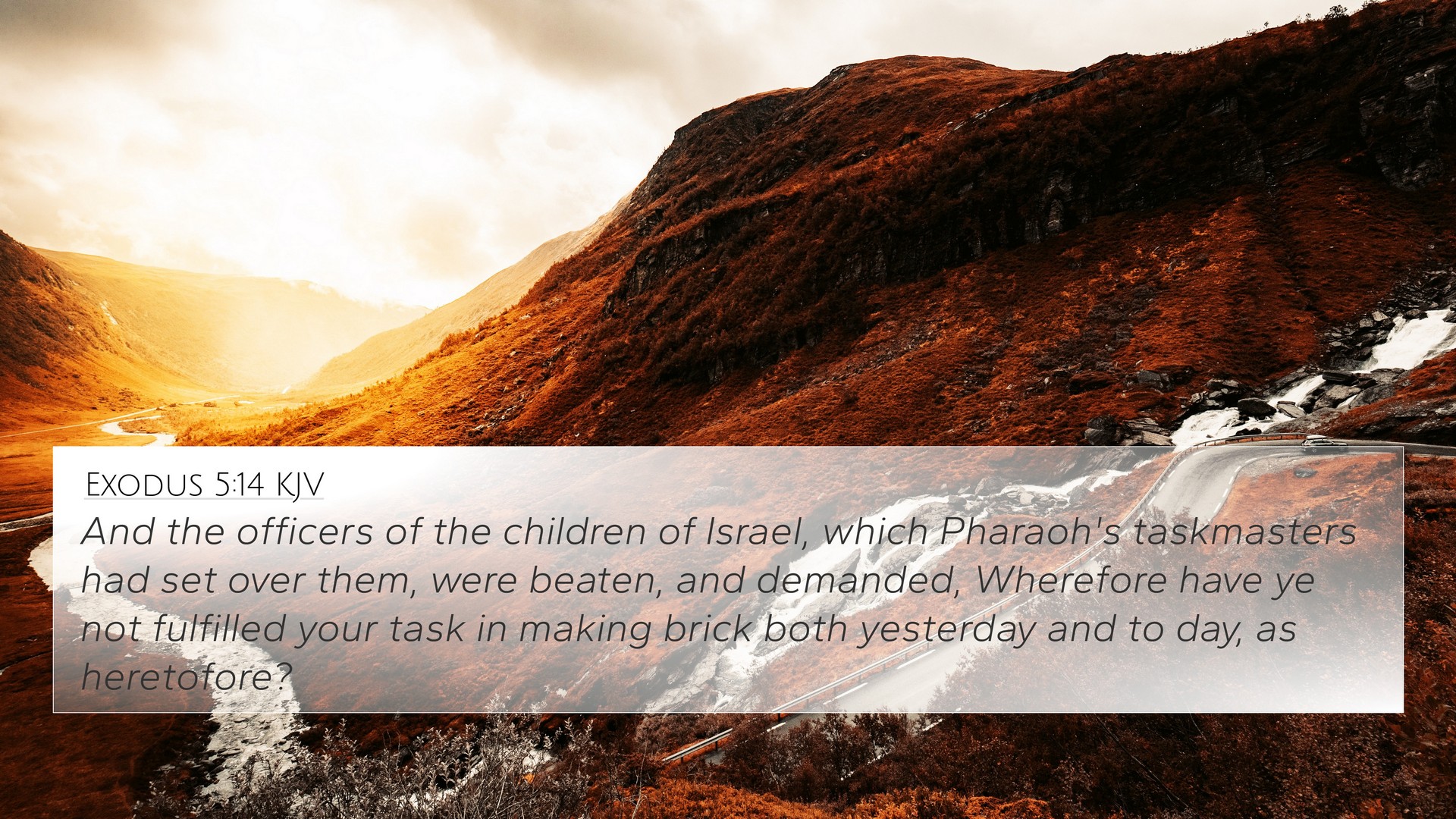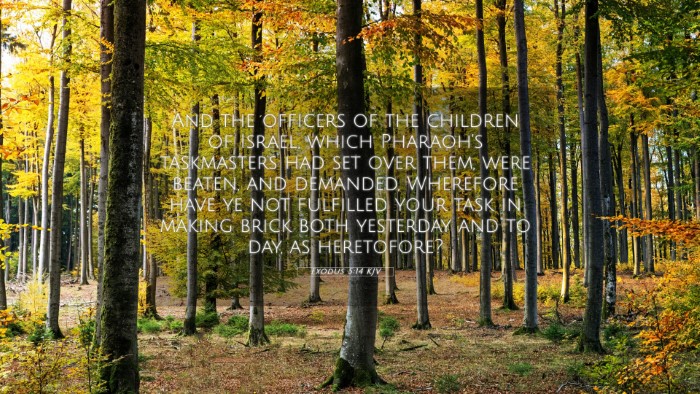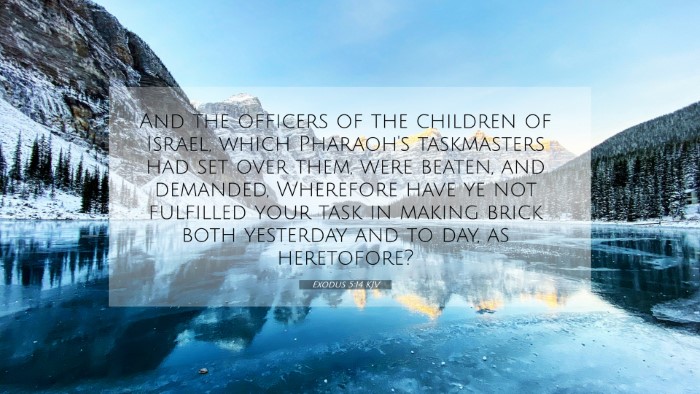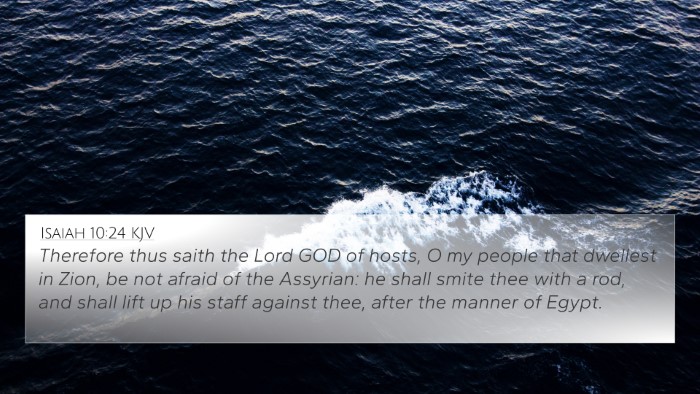Understanding Exodus 5:14
Exodus 5:14 states: "And the officers of the children of Israel, which Pharaoh's taskmasters had set over them, were beaten, and demanded, Wherefore have ye not fulfilled your task in making brick both yesterday and to day, as heretofore?" This verse is a critical juncture in the narrative of Exodus, highlighting the oppression faced by the Israelites and the intensification of their burdens.
Summary of Insights from Commentaries
The commentaries by Matthew Henry, Albert Barnes, and Adam Clarke provide a deep contextual understanding of this verse.
- Matthew Henry: Henry emphasizes the cruelty of the Egyptian taskmasters and the unjust treatment of the Israelites. He points out that their rigorous labor without the means to fulfill it reflects the harshness of Pharaoh's reign, which serves as a foreshadowing of God's eventual judgment upon Egypt.
- Albert Barnes: Barnes notes that the beating of the Israelite officers signifies not only the physical oppression but also the psychological warfare employed by Pharaoh to instill fear. The lack of bricks demonstrates the impossible demands placed on them, mirroring the struggles that many face when burdened by authorities.
- Adam Clarke: Clarke reflects on the significance of the officers being questioned. He suggests that their predicament symbolizes the broader suffering of the people, illustrating the chain of injustice from Pharaoh down to the taskmasters, and highlights God’s eventual deliverance through Moses.
Thematic Connections and Cross-References
This verse holds connections to various themes and passages throughout the Bible. It serves as a poignant reminder of God's deliverance amidst oppression.
- Genesis 15:13: God foretold the Israelites' enslavement, linking it to His promise of deliverance.
- Exodus 1:13-14: Details the oppression of the Israelites by the Egyptians, showcasing the fulfillment of the prophecy from Genesis.
- Psalm 105:25: States that God turned their hearts to hate His people, reinforcing the cruelty faced by the Israelites.
- Isaiah 19:1-4: Prophecies regarding Egypt's downfall point back to the injustice depicted in Exodus.
- Acts 7:19: Stephen recounts the oppression of the Israelites in his speech, highlighting this significant history.
- Romans 8:31: Connects with the theme of God’s ultimate protection and purpose, reassuring believers amidst trials.
- Matthew 11:28: Jesus invites the weary to find rest, symbolizing a fulfillment of the deliverance promised to the oppressed.
Insights into the Nature of Oppression
This verse illustrates fundamental themes of suffering, resilience, and eventual redemption. The Israelites faced relentless injustices, paralleling modern experiences of oppression.
Spiritual Reflection
Believers can reflect on how God works through suffering and injustice. The cross-referencing of related Bible verses enriches the understanding of God's providence and purpose through trials. Understanding the interconnectedness of scripture deepens faith and provides hope.
Tools for Cross-Referencing Biblical Texts
Utilizing a Bible concordance can significantly aid in identifying connections between Bible verses. Here are some tools that assist in cross-referencing:
- Bible Cross-Reference Guide: Essential for quick access to related verses.
- Cross-Reference Bible Study: A method to systematically explore thematic links.
- Comprehensive Bible Cross-Reference Materials: Provide extensive resources for deeper study, assisting in sermon preparation and theological research.
Conclusion
Exodus 5:14 is a vital touchstone in the narrative of the Israelites’ suffering under Pharaoh’s rule, offering deep insights into the nature of oppression and God's eventual deliverance. Through careful study, cross-referencing provides a fuller understanding of scriptural themes and historical contexts, allowing believers to find hope and encouragement in their own trials. The connections between Bible verses are rich and layered, showcasing the complexity and coherence of God's word.



